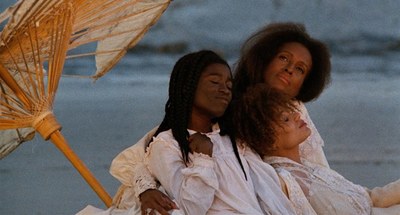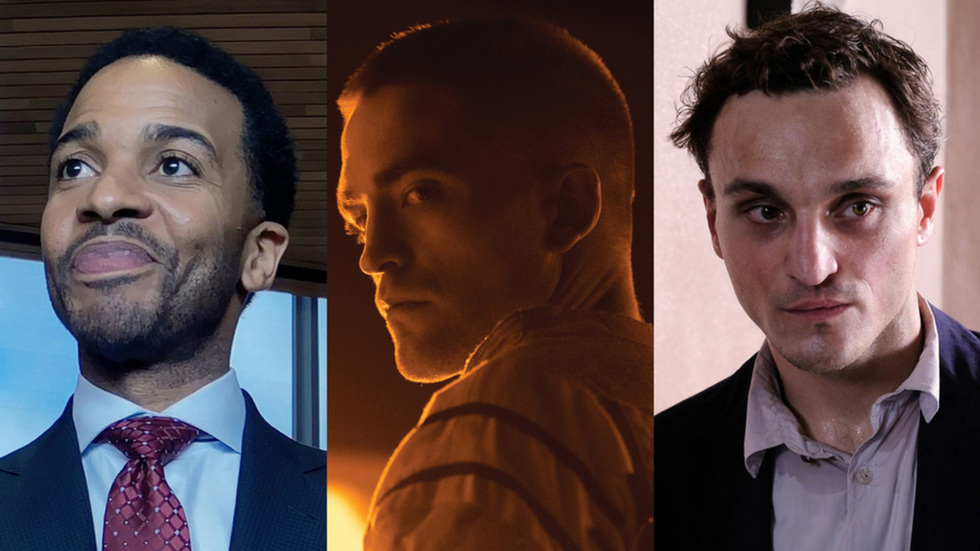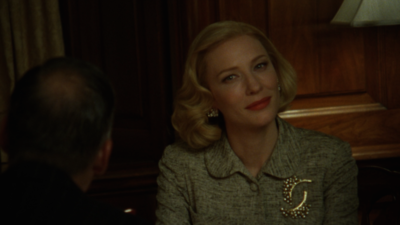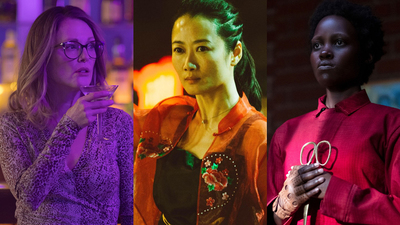
BY MATTHEW ENG |
The 12 Best Male Film Performances of Early 2019
These screen performances may have debuted during the first half of 2019 but their achievements deserve to be discussed and remembered all year round.

A great performance can make a trivial film worth watching and an already solid one even better. Each of the actors featured on this list are major assets to the some of the finest films that have opened—or, in one case, aired—during the first six months of the year, bringing depth and dynamism to characters who either stand in the foreground or linger on the sidelines of their respective narratives. At a time when all it takes to win an acting Oscar are a flashy set of dentures and some pre-recorded vocals, these mighty performances deserve to be sought out and championed for coupling meticulous technique and limitless creative power to help tell the types of human stories that keep us returning to the movies.

Tom Burke, The Souvenir
Tom Burke never truly allows us to penetrate the hard-edged surface of Anthony, the heroin addict whose downward spiral alters the life of a budding filmmaker in The Souvenir, Joanna Hogg’s autobiographical memory piece. And that’s just as it should be, since Hogg has set out to recreate a remembered experience, one that deliberately keeps the interiors of those outside her protagonist at bay. Instead of exposing his character’s inner life, Burke embodies his role as fully as possible, drawing out his acidic put-downs and delineating each lazy gesture that emanates from his perpetually languid carriage to create an entrancing exterior, one that would plausibly magnetize and madden a young woman in the throes of first love. There is always the hint of a deeper being dwelling beneath Burke’s heavy lids and lizard’s gaze, but the actor resists the urge to make it known. His Anthony is a seductive and tragic object of recollection, inaccessible to scene partners and audience members alike, but far from invulnerable.

Murat Cemcir, The Wild Pear Tree
Idris, the debt-ridden paterfamilias dragging down his writer son in Nuri Bilge Ceylan’s The Wild Pear Tree, could have been played in any number of conclusive ways—as a feckless charmer, say, or a self-pitying sad sack. Actor Murat Cemcir opts for a more psychologically complex interpretation that refuses to come down hard on the character. From scene to scene, Idris vacillates from an affable teddy bear to an expert blame-shirker; it’s often impossible to tell whether he’s even aware of the pit he has sunk his family into, much less his own shortcomings, or just doing an astonishing job at deluding himself. Cemcir doesn’t need to spell out these choices in his performance, but instead relies on his raffish presence and the abiding twinkle in his eye to keep us re-evaluating Idris’ veiled motivations.


Jimmie Fails, Jonathan Majors, and Rob Morgan, The Last Black Man in San Francisco
The Last Black Man in San Francisco is a film of striking visual beauty, but all of its craft would have been for naught without the naturalistic central turns of Jimmie Fails and Jonathan Majors, playing two friends navigating hard times and dashed hopes in a rapidly gentrifying city that has seemingly closed all its doors to them. Fails, playing a dreamer who bears his name and real-life familial history, is a novice to the art of film acting but his calm and confident demeanor evince an innate talent; he floods each frame with a warmth that simply cannot be taught or instilled. As Monty, a sensitive and inquisitive Oakland playwright, the Yale-trained Majors remains in perfect harmony with Fails’ organic approach; we have seen variations on the type of free spirit that Monty represents, but Majors’ rendition is one of the clearest and most moving ever realized. Neither actor strives for import, instead relating to each other with a moment-to-moment casualness that allows their characters’ personal feelings to shine through no matter the situation. Together, they gently remind us how rare and radical it is to see two platonically attached Black men show everyday care and camaraderie for one another on the big screen, a realization crystallized in the film’s final, indelible minutes. As Majors stares out across an ocean that is, for Jimmie, an open road and, for Monty, an unbridgeable void, his eyes are iridescent with despondency, containing a world of love that no distance can extinguish.
As James Sr., Jimmie’s self-estranging father, Rob Morgan commands our unwavering focus in the same film with what can surely be no more than five minutes of screen time. Morgan’s frank and unsympathetic steeliness is so deeply ingrained in each line and gesticulation that it feels like we’ve genuinely wandered into a life already in progress during his first scene, in which Morgan manages to mesmerize just by chomping on sunflower seeds. The actor leads the father-son exchanges that follow with a magnetic potency so lethal that it briefly obliterates our protagonist’s hopes and dreams. After this and his unsung, MVP performance in Mudbound, Morgan has more than earned himself a role that will center his consummate abilities.

Marcello Fonte, Dogman
A filmmaker less astute and compassionate than Matteo Garrone might have directed Marcello Fonte to play his title character in Dogman as either schlemiel or schlimazel. As Marcello, a canine groomer, single father, and part-time drug dealer in a gloomy Italian coastal village whose fate becomes entangled with that of a vicious thug, Fonte possesses a robust talent beneath his skeletal frame and furtive demeanor. He has a face that was made to be filmed and studied, distinguished by a pair of sunken eyes that convey a wide range of conflicted emotions throughout Garrone’s grim fable. Marcello’s plight could have merely been the source of cheap, ridiculing gags or holier-than-thou sermonizing, but neither Garrone nor Fonte are interested in using the character as a target for easy satire or moralization. Instead, Garrone permits his game and gifted leading man to play his role with a straightforward realism that gives dignity to a dehumanized individual. Fonte, in turn, enables Marcello’s plummet from complicit, tenderhearted everyman to cold-blooded avenger to assume a clarifying sense of tragedy, one made all the more poignant for occurring to an actual human being and not a stock character.

André Holland, High Flying Bird
If Hollywood still made the loquacious screwball comedies that dominated the 1930s and ‘40s, André Holland would be an ideal choice to lead them. At several key instances in High Flying Bird, director/cinematographer Steven Soderbergh simply fixes his camera—in this case, an iPhone—on Holland as the actor delectates in the rapturous delivery of one of Tarell Alvin McCraney’s fantastically florid monologues. Holland is ideally cast here as a dynamic sports agent sowing the seeds of rebellion during an NBA lockout, not just because the actor remains a veritable wellspring of charisma, but because he is uniquely gifted at harnessing breakneck dialogue to reveal psychological nuance through purposeful emphases and odd, seemingly off-the-cuff cadences. He creates an idiosyncratic character beneath, on top of, and in between the lines of the script, often while wearing the irresistible grin of a born talker—and performer—who knows his mind is always ten steps ahead of even the worthiest sparring partner.

Félix Maritaud, Sauvage
Félix Maritaud brings intense commitment and emotional depth to his role as Léo, a 22-year-old, gay street hustler, in Sauvage that it is impossible to imagine Camille Vidal-Naquet’s pulsating character portrait existing without his crucial contributions. Like Julianne Moore in this year’s Gloria Bell, Maritaud appears in every scene and nearly every shot of the film that pivots on his performance, requiring him to the set the piece’s tone and temperature for its entirety. This would be a daunting challenge for any actor, much less a young actor in his first starring role. But Maritaud never breaks a sweat, except when Léo is gyrating with lusty abandon on the dance floor. His performance is a lived-in tour de force marked by a sprightly presence and subtle craftsmanship that embeds us within the character’s arc, never calling attention to its inner workings. Maritaud fully examines and openly expresses every part of Léo—his ardent pining for a fellow hustler, his brooding fury over on-the-job humiliations, and his embarrassed longing for succor and solace. This last desire manifests in a mid-film visit to a clinic as Léo suddenly embraces the female doctor who has shown him such candid and concerned kindness, a gesture of intimacy so overwhelming that those who have seen Sauvage will never forget the way Maritaud’s eyes shut and body slackens, relieved at finding unexpected refuge in the arms of a stranger.

Robert Pattinson, High Life
Robert Pattinson’s unflagging dedication to his recent directors, from James Gray to Josh and Benny Safdie to Claire Denis, has resulted in some of the finest screen acting of the decade and performances that are something like acts of immersion. In Denis’ High Life, Pattinson’s physical beauty is an ideal object of scrutiny for a director long fascinated by the ways in which a cinematic body can reveal and refract a lived experience the cinematic possibilities of the human body. As Monty, one of a group of convicts shot into deep space for a doomed mission, Pattinson lends methodical concentration and welcome soulfulness to Denis’ virtuosic foray into the realm of science fiction. For all its shocks and provocations, nothing in High Life haunted me quite as profoundly as the wearied spirit beneath Pattinson’s hard body, a sadness that will not yet allow itself to surrender to death’s oblivion. Psychological portraiture is seldom the focus of Denis’ filmmaking, but Pattinson implies an intricate interior world inflected by the sordid desires and burning, sometimes brutal impulses that Monty refuses to give in to. Although Denis forbids us from seeing all the way inside the character, those intently concentrating on Pattinson are rewarded by his habit of lingering on certain moments, lengthening pauses and prolonging glances to encourage our own exploration into the psyche of this tortured but resolute man, a prisoner in more ways than one.

Franz Rogowski, Transit
Franz Rogowski drifts into Christian Petzold’s Transit like the ghost of a man. As Georg, a desperate refugee posing as a writer to gain Mexican asylum and escape an occupied and increasingly hellish Europe, Rogowski first appears visibly emptied of feeling. Georg is a scarred witness to the atrocities of life during wartime, an enigma defined only by a drive to survive. His clammy body is shifty in its motions, as though not wishing to be noticed; his eyes are vacant, save for the troubled look that emanates in an early, pivotal moment of fight-or-flight calculation. Rogowski serves as the steady center of Petzold’s dystopian drama, and his revelatory performance is a carefully calibrated crescendo in which this blank canvas accrues new marks of affection, wistfulness, and guilt, becoming an ever more layered creation in the process. The actor has been endowed with an unconventionally beautiful face as distinctive and demonstrative as Al Pacino’s, but one that can be easily restricted of its full expressive power depending on who is standing behind the camera. We have seen the brooding hardness in Rogowski’s features before, but Petzold is one of the first directors to showcase its kindness, pleasing not in spite of its bruises but because of them. Petzold’s camera basks in the softness of Rogowski’s emoting visage as Georg lies in the arms of a newfound love or loses himself in the recital of a remembered lullaby from his youth, our dawning recognition of the actor’s capabilities paralleled by our gradual understanding of the character as Georg emerges from his self-preserving state of detachment. It is only fitting that Petzold ends his film with a devastating close-up of Rogowski lit from within by a foolish and impossible hope, his face a worn map eager to be discovered and read by an audience already attuned to its every microscopic movement.

Géza Röhrig, To Dust
Láslzó Nemes’ Son of Saul cleaned up in the foreign-language categories during its 2015 awards run, but leading man Géza Röhrig went curiously unrecognized despite being the very nucleus of that harrowing Holocaust drama. The qualities that Röhrig used to deepen and humanize Nemes’ exercise in audience immersion—his tireless sincerity and unassuming physical grace—also help elevate To Dust, the inspired debut of writer-director Shawn Snyder, in which the actor stars as a neurotic Hasidic man seeking unattainable answers about science and the afterlife following his wife’s death. Röhrig is responsible for much of the dark hilarity here, not only because he is a master comedian, but because he shrewdly plays the film’s witticisms and escapades as straight as he can until the very end, perhaps knowing that real life is so much odder and funnier than rampant mugging and overstated puns. By maintaining this honesty, Röhrig finds surprising comedy—and well-earned pathos—in the spontaneity of human interaction and one’s own solitary existence.

Jeffrey Wright, O.G.
Jeffrey Wright isn’t always cast in a way that befits his status as a top-tier thespian who can enliven even the paltriest of material. In each of his performances, Wright seems to establish singular vocal and physical vocabularies for his characters that work to delineate and differentiate personas as disparate as Jean Michel Basquiat, Angels in America’s Belize, Westworld’s Bernard, and O.G.’s Louis. This latter role, a middle-aged convict awaiting release after more than two decades of incarceration, allows the actor to implant himself within a specific American experience and embody its reality with the same truthful diligence that Wright supplies to all of his projects. Filmed within a real prison alongside actual inmates, Madeleine Sackler’s HBO drama was beset with certain snags and constraints during its production, none of which are evident in Wright’s seamless work. All we see is a gruff but attentive man marked by hard times and unceasing grief for a life far beyond his reach. Wright’s body is instrumental here, betraying all the innermost anguish and expectation that Louis is reluctant to verbalize or wear across his face; his sturdy frame expands, as if emerging from hibernation, at the faintest glimmer of freedom and shrinks back into himself with each internal and external setback. Such a performance is only possible from a master like Wright, who exudes a quiet confidence in his boundless skillset and acts, first and foremost, to illuminate the lives of others.

